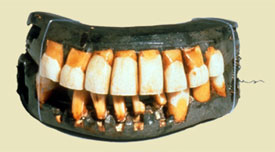 Ok – that’s not a particularly sexy title. I admit it. But it is a valid point when one writes gay historical fiction. Writing bed-scenes when your writhing couple didn’t own a bath or shower and wouldn't do for several hundred years might be a turn-off for your reader.
Ok – that’s not a particularly sexy title. I admit it. But it is a valid point when one writes gay historical fiction. Writing bed-scenes when your writhing couple didn’t own a bath or shower and wouldn't do for several hundred years might be a turn-off for your reader.These days we are all Germ Free Adolescents, washing our hair every day and brushing our teeth whilst wearing scented panty liners but history, in general, is not famous for its hygiene. We all know the stories of people carrying posies around so they couldn’t smell the world around them, or scattering rue and rosemary on the rushes to keep down the fleas. I believe the rumour is that Elizabeth I took a bath twice a year, whether she needed it or not.

Once the Romans left England, plumbing became a lost art, and wasn’t really rediscovered for about two thousand years. In the interim times, well, let’s say that the natives were sometimes a little revolting.
There weren’t a lot of cosmetic dentists around in earlier times, and although the toothbrush had been invented in the 15th century, it didn’t really catch on that well (just as well we STILL don’t have to brush using badger or pig’s bristles…), and flossing? Forget it, that’s not caught on in England even today... (joke… joke…).
The Romans definitely had it right, and it's probably because of this that this is one of the most popular gay historical eras - it's very easy to get your men naked ("Fancy a trip to the Baths, Lividius?" "Don’t mind if I do, Maximus, old Beanus.") and nice and clean and ready for action.
The Greeks too, were sticklers for cleanliness, and not only that, they were accepting of male love, so no problems there.
It’s when you push ahead a few centuries that you begin to have problems, particularly in more northerly locations where people are covering themselves in skins and bear fat and not peeling off until Spring. Cowboys - out on the range for months on end in a dust bowl, Shakespearian Luvvies sharing their beds with lice and bed-bugs, naval commanders rogering the cabin boy who hasn't seen warm water or fresh fruit for an Atlantic crossing.
So how do get your hero’s todger out of his breeches and into the willing hand of his boyfriend without worrying whether their bed holds more life than just the humans? Ha ha! It’s possible, and with a little bit of suspension of belief without being totally anachronistic, too.
Say for example, you have a couple of lusty young shepherds who have been working on the farm all day in an 18th century small-holding and they look at each other over the sheep dip and they are sweating, the curls sticking to their foreheads, both covered in sheep-muck – and….Hmmm. Problem.
So – here are your basic guidelines for smexxing it up in days gone by:
1. Remember your characters come from a time when hygiene wasn’t a great issue.
They were used to smells; they aren’t going to be put off when it comes down to it. Concentrate on manly sweat, and accurate scents that might be there, rosemary, juniper and cinnamon. Celery and cardamom (often chewed to freshen the breath)
Say for example, you have a couple of lusty young shepherds who have been working on the farm all day in an 18th century small-holding and they look at each other over the sheep dip and they are sweating, the curls sticking to their foreheads, both covered in sheep-muck – and….Hmmm. Problem.
So – here are your basic guidelines for smexxing it up in days gone by:
1. Remember your characters come from a time when hygiene wasn’t a great issue.
They were used to smells; they aren’t going to be put off when it comes down to it. Concentrate on manly sweat, and accurate scents that might be there, rosemary, juniper and cinnamon. Celery and cardamom (often chewed to freshen the breath)
2. Ignore teeth.
It’s better not to keep referring to everyone’s perfect teeth because that’s going to be pretty damned unlikely before modern times and National Health dentistry. Assume that your hero and heroine are savvy enough to eat well and haven’t been stuck on long ship voyages. Snogging someone with bleeding gums or a jaw full of wooden dentures ain’t never going to be sexy.
going to be pretty damned unlikely before modern times and National Health dentistry. Assume that your hero and heroine are savvy enough to eat well and haven’t been stuck on long ship voyages. Snogging someone with bleeding gums or a jaw full of wooden dentures ain’t never going to be sexy.
It’s better not to keep referring to everyone’s perfect teeth because that’s
 going to be pretty damned unlikely before modern times and National Health dentistry. Assume that your hero and heroine are savvy enough to eat well and haven’t been stuck on long ship voyages. Snogging someone with bleeding gums or a jaw full of wooden dentures ain’t never going to be sexy.
going to be pretty damned unlikely before modern times and National Health dentistry. Assume that your hero and heroine are savvy enough to eat well and haven’t been stuck on long ship voyages. Snogging someone with bleeding gums or a jaw full of wooden dentures ain’t never going to be sexy.Remember Horatio Hornblower? . He used to shower daily on deck to the general amusement of all (which included his fellow lieutenants who
 were probably a little more fragrant than he was.) Horatio’s skin would have tasted deliciously of salt, and not of rancid sweat. What a damned shame that Lieutenant Bush never took advantage of this, canonically. I’m pleased to say, though, that there are now a few Age of Sail novels (Lee Rowan’s Ransom, Alex Beecroft’s Captain’s Surrender) that are exploring the love of 17th Century sailors - for other sailors.
were probably a little more fragrant than he was.) Horatio’s skin would have tasted deliciously of salt, and not of rancid sweat. What a damned shame that Lieutenant Bush never took advantage of this, canonically. I’m pleased to say, though, that there are now a few Age of Sail novels (Lee Rowan’s Ransom, Alex Beecroft’s Captain’s Surrender) that are exploring the love of 17th Century sailors - for other sailors.An Erastes staple! I have had a bed-bath in both my novels so far. Not only are they a great way to get rid of any revolting smells, smeg and other things wot shouldn’t be on skin when a tongue is going to be stuck in any orifice handy, but they are sexy as hell and get the juices flowing, and the blood surging to places where it should be surging. Natural sponges=sexy.
6. Don’t forget the times when hygiene WAS important.
Even in Britain, before the Romans buggered off and us English reverted to smelly painted savages, there was underfloor heating, hot water, communal baths, massages, showers and hot and cold running slaves. Egypt, China, Japan too - all had higher civilisation than northern Europe.
Even in Britain, before the Romans buggered off and us English reverted to smelly painted savages, there was underfloor heating, hot water, communal baths, massages, showers and hot and cold running slaves. Egypt, China, Japan too - all had higher civilisation than northern Europe.
Here’s proof.
 Of course it meant that one’s man had to stand on a step-ladder and pour water into the top – but perhaps one’s man enjoyed this task – and he’d certainly enjoy drying sir off afterwards. But not with a soft thick towel please!!! Not until after the Great Exhibition!
Of course it meant that one’s man had to stand on a step-ladder and pour water into the top – but perhaps one’s man enjoyed this task – and he’d certainly enjoy drying sir off afterwards. But not with a soft thick towel please!!! Not until after the Great Exhibition!Have good clean fun!
Erastes writes gay historical fiction. Her novels range from the English Civil War to Victorian times. Find out more about her books and short stories at her website www.erastes.com. She is also the owner of SPEAK ITS NAME the only place on the planet dedicated to gay historical news, reviews and interviews.






2 comments:
This is a deliciously provocative post! And very helpful. I suspect it's impossible for us to recreate the sensory experiences of a long bygone era - say, the pomander balls and adrenalin-driven sweat of a Jacobean court masque, or the peculiar medley of hippocras, galingale, and tabor at Harry Bailey’s 14th century tavern.
But I think it's wrong to picture all our ancestors as being smelly brutes. Even in Renascence times, the gentry were - for the most part - as well washed as ourselves. Castile soap was being sold in 16th century London. Sir Hugh Platt invented a primitive jacuzzi at the turn of the 17th century. Breath fresheners were available at every apothecary shop.
True, the common folk probably did stink but their stink was commented on by the gentry. Shakespeare had Julius Caesar faint, such was the halitosis of the mob. I think that people were selectively aware of body odours. They might ignore the ubiquitous smell of garlic, chewed as a plague repellant, or of urine lingering on ladies' hair (lotium water), but take exception - say - to grossly smelly feet.
I think a lot of historical novels would be more compelling if they discriminated in these details rather than accepting the stereotype that everyone born much before the 19th century was short, brutish and odorous!
I would say that hygiene issues may very well be one of the main reasons I like to write during the Roman era! A sewage system is the hallmark of civilization ;)
Post a Comment